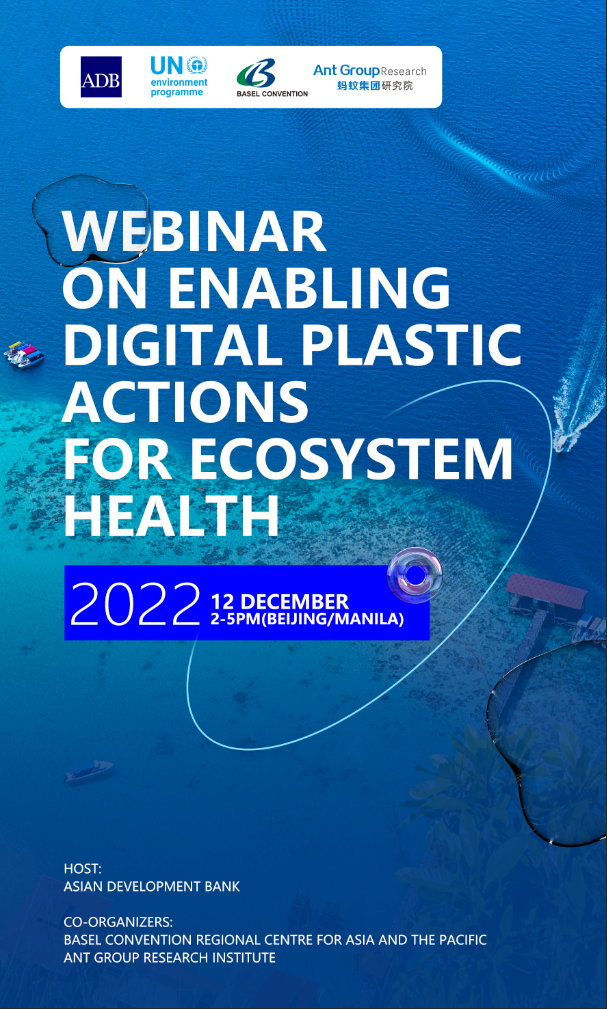Seminar & Lecture Series
Enabling Digital Plastic Actions for Ecosystem Health
2 - 5 pm Beijing Time, 12 Dec 2022 Online
Global plastics production and demand has continued to grow relentlessly, fueled by its use and lack of substitutability in preserving food, insulation material in construction, use in electronics, and material in motor vehicles to improve fuel efficiency, among other things. Yet, the sheer magnitude of plastics consumption in our societies results in a high production-related carbon footprint, high volumes of waste, persistent pollution byproducts, and causing harm to wildlife and ecosystems. A UNEP study showed over 14 million metric tons of plastic enter and damage aquatic ecosystems annually, with greenhouse gas emissions associated with plastics are expected to account for 15 percent of the total emissions allowable by 2050 if humanity is to limit global warming to 1.5°C. To solve the plastic pollution problem, the UN Environmental Assembly reached a consensus in March 2022 to develop an international legally binding instrument on plastic pollution by 2024 and kick off its negotiation that ended on 2 December 2022 in Uruguay. At the same time, UN Biodiversity Conference (COP15) to develop its framework 2030 is happening on 7-19 December 2022, and UNFCC (COP27) agreed on the Loss and Damage fund in November 2022 for the ecosystem health.
For the ecosystem health, ADB had made great efforts. ADB is championing a climate bank in the Asian and Pacific region with its ambition to deliver climate financing of $100 billion from 2019–2030 and has committed to aligning new operations to the goals of the Paris Agreement, including 100% sovereign operations by July 2023 and 100% non-sovereign by 2025. ADB also launched Action Plan for Healthy Oceans and Sustainable Blue Economies in May 2019 to expand $5 billion from 2019-2014, including co-financing from partners. ADB has also been promoting the circular economy.
In the PRC, ADB has adopted an ecosystem approach to increase the PRC’s natural capital investment and climate finance, especially in the Yangtze River and Yellow River basins, with more than $4 billion. In May 2022, GEF CEO endorsed $ 9 million to reduce the agriculture field plastic and conserve biodiversity by innovating the ecological compensation in the Yangtze River basin. In response to the pandemic, ADB cooperated with the PRC on digitalization with private sectors to help DMCs respond to COVID-19 and explore solutions for global environmental challenges.
As one of the most changing problems, plastic pollution control needs strong interagency cooperation and multiple-stakeholder involvement and digital actions, for example, consumer behavior changes need fintech support, producers’ extended responsibilities policy needs blockchain for tracing, zero waste cities need the big data platform, and green e-commerce needs enabling policies.
This webinar would work with multiple stakeholders to promote the digitalization in plastic pollution control for the circular economy development, explore better solutions for ocean health, and increase the natural capital investment and climate finance for ecosystem health and regional post-COVID recovery.
Join via Zoom.
Meeting ID: 99561383059
Passcode: WEB221212
| Time | Program |
|---|---|
| 14:00 – 14:30 | Opening Remarks Moderator: Thomas Panella, Director, Environment, Natural Resources and Agriculture Division (EAER); East Asian Department (EARD); Chair of Water Sector/Group Committee, ADB Scaling Up Investment on Climate Change and Ecosystem Health. M. Teresa Kho, Director General, EARD, ADB The PRC’s Plastic Pollution Control Policies and Actions. Yong Ren, Director General, Department of Solid Wastes and Chemicals, Ministry of Ecology and Environment (MEE), the PRC The Potential Impact of a New Global Treaty on Plastic Pollution to the PRC. Ruihe Tu, Head of China Office, UNEP |
| 14:30 – 15:15 | Session I: Global Action on Plastic Pollution Control Keynote Presentation: The PRC’s Zero-Waste City Road Map and Its Global Implications. Jinhui Li, Executive Director of BCRC PRC Plastic Pollution Control for Rivers and Oceans Ecosystem Health. James G. Baker, Senior Circular Economy Specialist (Plastic Wastes), Climate Change and Sustainable Development Department, ADB Comment: Marzia M. Mongiorgi-Lorenzo, Principal Economist, EARD, ADB Stefan Rau, Senior Urban Specialist, Urban and Social Sectors Division, EARD, ADB |
| 15:45 – 16:55 | Round Table on Innovative Multi-stakeholder Collaboration on Digital Plastic Pollution Control Moderator: Au Shion Yee, Senior Water Resource Specialist, EAER, EARD, ADB Panelist: Xiaoying Wang, Secretary General of the Green Development Office and Director of the Sustainable Development Department, Ant Group Deyuan Zhang, Associate Professor, Vice Chief, Macroeconomic Research Institute of the National Development and Reform Commission Xi Fang, Assistant of Director, Development and Research Center of the State Post Bureau Nanette Medved-Po, Founder and Chairperson at Hope and Plastic Credit Exchange Wang Wang, Executive Vice President of the Plastic Recycling Branch of PRC Synthetic Resin Association Jevons Yu, Head of Purchasing Department, Marketing and E-Commerce, C-Store Q&A Summing Up: Au Shion Yee, Senior Water Resource Specialist, EAER, EARD, ADB |
| 15:05 – 16:05 | Closing Remarks: Enabling Digital and Financial Innovations on Plastic Reduction Moderator: Zhu Yuping, First Secretary, Department of International Trade and Economic Affairs, Ministry of Commerce Albert F. Park, Chief Economist and Director General, Economic Research and Regional Cooperation Department, ADB |


